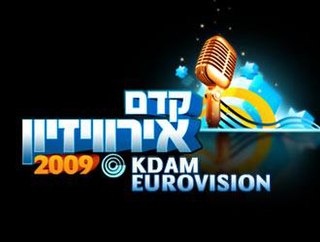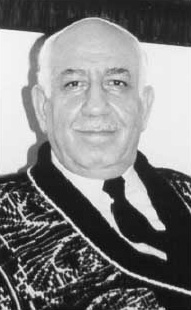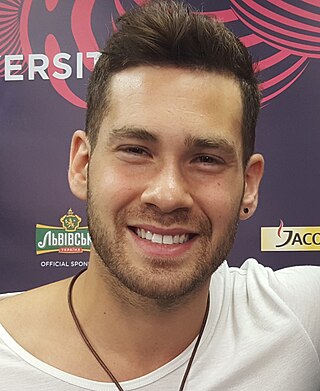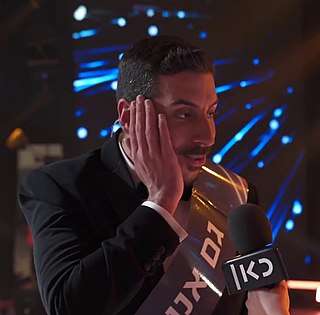The Eurovision Song Contest, often known simply as Eurovision, is an international song competition organised annually by the European Broadcasting Union. Each participating country submits an original song to be performed live and transmitted to national broadcasters via the Eurovision and Euroradio networks, with competing countries then casting votes for the other countries' songs to determine a winner.

Seán Patrick Michael Sherrard, also known professionally as Johnny Logan, is an Australian-born Irish singer, songwriter and musician. He is known for being the first of only two performers to win the Eurovision Song Contest as a lead singer twice.

Izhar Cohen is an Israeli singer who won the 1978 Eurovision Song Contest.

Israel has participated in the Eurovision Song Contest 46 times since making its debut in 1973. The current Israeli participant broadcaster in the contest is the Israeli Public Broadcasting Corporation (IPBC/Kan). Israel has won the contest four times, and has hosted the contest in Jerusalem in 1979 and 1999, and in Tel Aviv in 2019.

"Sameyakh" or "Sameach" is a Hebrew song by the techno / pop band PingPong, a quartet consisting of Guy Asif, Roy Arad, Yifat Giladi and Ahal Eden. The song was the Israeli entry in the Eurovision Song Contest 2000.
PingPong is an Israeli pop quartet that represented Israel in the Eurovision Song Contest in 2000 with the song "Sameach".

The Kdam Eurovision, in short known as the Kdam was the Israeli national preselection of the Eurovision Song Contest. The competition was first introduced in 1981 and ran until 2014.

Naeim Giladi (18 March 1926 – 6 March 2010) was an anti-Zionist Iraqi Jew, and author of an autobiographical article and historical analysis titled "The Jews of Iraq". The article later formed the basis for his originally self-published book Ben-Gurion's Scandals: How the Haganah and the Mossad Eliminated Jews.

Svika Pick, was an Israeli pop singer, songwriter, composer, and television personality.
Israel was represented at the Eurovision Song Contest 1986 with the song "Yavo Yom" (יבוא יום), composed by Yoram Zadok, with lyrics by Moti Giladi, and performed by Moti Giladi and Sarai Tzuriel. The Israeli participating broadcaster, the Israel Broadcasting Authority (IBA), selected its entry for the contest through Kdam Eurovision 1986.
Israel participated in the Eurovision Song Contest 2009 with the song "There Must Be Another Way" written by Noa, Mira Awad and Gil Dor. The song was performed by Noa and Mira Awad, who were internally selected by the Israeli broadcaster Israel Broadcasting Authority (IBA) in January 2009 to compete at the 2009 contest in Moscow, Russia. The song Noa and Awad would perform at Eurovision was selected through the national final Kdam Eurovision 2009 which took place on 2 March 2009 that featured four songs. "Einaiych " emerged as the winning song after achieving the highest score following the combination of votes from two regional juries, a jury panel and a public vote.
These are the collective events from the 19th century in the year 1986 in Israel. With former leaders and development to the Asian states.

Laurent Amir Khlifa Khedider Haddad, better known as Amir Haddad or simply as Amir, is a French-Israeli singer-songwriter and actor. He took part in 2006 in the Israeli music competition Kokhav Nolad, released his album Vayehi in 2011 and was a finalist in French competition The Voice: la plus belle voix as part of Team Jenifer finishing third in the competition. He represented France in the Eurovision Song Contest 2016 with the song "J'ai cherché", which finished in sixth place.

Nadav Guedj is an Israeli singer and actor who represented Israel in the Eurovision Song Contest 2015, where he finished in 9th place. He is the winner of season two of HaKokhav HaBa. Guedj was born in Paris.
Israel was represented at the Eurovision Song Contest 1979 with the song "Hallelujah" (הללויה), composed by Kobi Oshrat, with lyrics by Shimrit Orr, and performed by Milk and Honey. The Israeli participating broadcaster, the Israel Broadcasting Authority (IBA), selected its entry through a national final, which ultimately won the contest. In addition, IBA was also the host broadcaster and staged the event at the International Convention Center's Ussishkin Auditorium in Jerusalem, after winning the previous edition with the song "A-Ba-Ni-Bi" by Izhar Cohen and the Alphabeta.
Israel was represented at the Eurovision Song Contest 1978 with the song "A-Ba-Ni-Bi" (א-ב-ני-בי), composed by Nurit Hirsh, with lyrics by Ehud Manor, and performed by Izhar Cohen and the Alphabeta. The Israeli participating broadcaster, the Israel Broadcasting Authority (IBA), selected its entry through a national final. The song went on to win the contest, bringing Israel its first Eurovision victory, and being the first victory for a country outside of continental Europe.

Hovav Sekulets, known by his stage name Hovi Star, is an Israeli singer. He represented Israel in the Eurovision Song Contest 2016 with the song "Made of Stars" by Doron Medalie.

Imri Ziv, known mononymously as Imri, is an Israeli singer and voice actor. After winning HaKokhav HaBa, he represented Israel in the Eurovision Song Contest 2017 in Kyiv with the song "I Feel Alive", finishing in 23rd place in the final.

Yaakov "Kobi" Marimi is an Israeli singer and actor. He represented Israel in the Eurovision Song Contest 2019 on home soil in Tel Aviv with the song "Home".

Sarai Tzuriel is an Israeli actress and singer.














